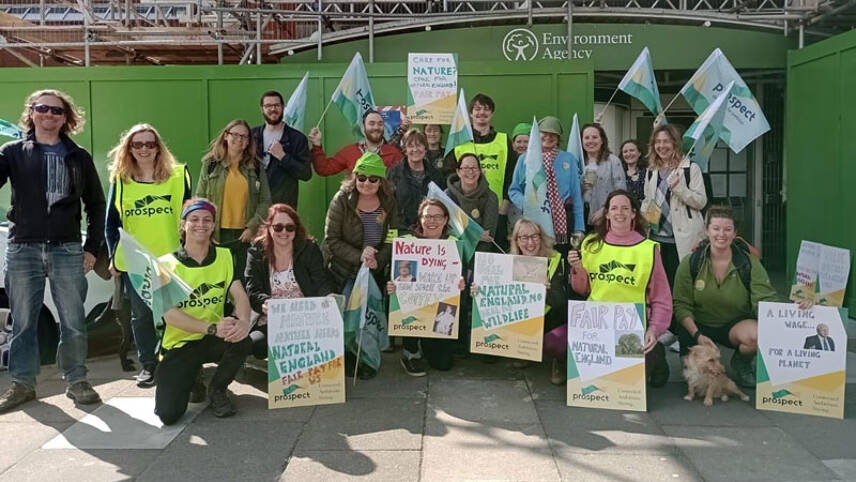Register for free and continue reading
Join our growing army of changemakers and get unlimited access to our premium content

Image: prospect Union. Pictured: Strikes at Natural England and Environment Agency in Spring 2023
Trade Union Prospect has this week revealed the results of a survey of 500 professionals working in expert nature-related roles across the UK. These include employees of public bodies like the Environment Agency and Natural England, as well as staff at NGOs and within the private sector.
Of those surveyed, 69% believed that the staffing levels for their teams were too low. Four in ten stated that their team sizes had been cut within the past year.
This has, for many, increased workloads. More than one-third (35%) of those polled said their workload had increased “significantly” over the past 12 months.
This extra work is not being rewarded with extra pay or new opportunities for progression for many of these professionals. Half said they have been offered no progression in their role over the past year. More than seven in ten said their annual salary was £40,000 or less, despite the fact that many roles require specific university degrees and/or extensive previous experience.
For context, the mean average UK salary is estimated to be around £38,600. This average worker likely has a university undergraduate degree, but four in ten environment workers have either a Master’s and/or a PhD.
The survey revealed that while most workers in climate and the environment are passionate about the topic, their working conditions and poor future prospects are increasingly leaving them burned out.
One survey respondent said: “I sacrifice a lot in terms of potential earnings to do the job I do because I find it interesting and I feel like that it makes a difference to the environment. However, this sacrifice is only widening each year as pay increases fail to keep up with inflation and automatic pay progressions are put on hold. I like my job and want to keep doing it, but I do also have a family to support.”
Another called the overall management of their role and career progression as a PhD-trained expert “demoralising”.
The survey also raised concerns about organisations hiring unqualified staff to ease workloads and minimise costs. This may get tasks done in the short run but could jeapordise progress in the longer term.
Prospect’s senior deputy general secretary Sue Ferns said: “The insights provided by our expert members are invaluable to understanding what is happening on the front line of the fight to tackle the climate crisis. They are telling us that the paring back of expert roles in their teams is leaving them increasingly burnt out.
“Despite the Government talking up the potential of green jobs, it is failing to put in place the funding needed to make working in the natural environment the aspirational career that it should be.”
Green skills gap
The UK Government has not provided a comprehensive update to its skills strategy since it enshrined net-zero by 2050 in law in 2019.
It has set a vision for the nation to host two million ‘green-collar’ roles by 2030, including roles in the clean energy and low-carbon transport value chains as well as in nature conservation and restoration.
But Ministers have repeatedly been warned that the Government is not on track to achieve this milestone sue to a lack of strategic planning. The Government’s own advisory body, the Climate Change Committee (CCC), has cautioned strongly against continuing the current “hands-off” approach to green skills development.
The CCC has calculated that the net-zero transition can deliver between 135,000 and 725,000 net new jobs by 2030.
Related article: Environment Agency workers went on strike for the first time earlier this year


Please login or Register to leave a comment.